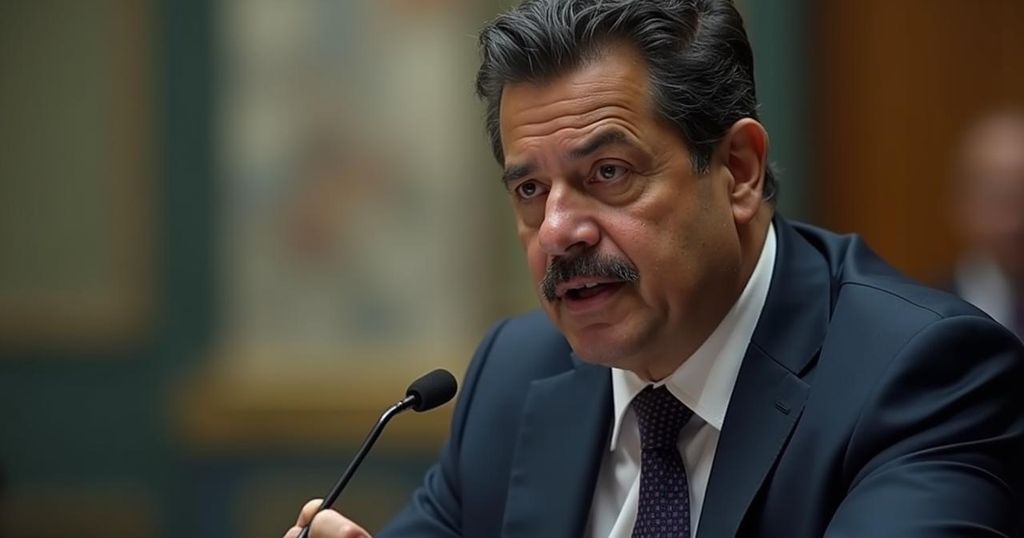Disappearance of Election Official Elvis Amoroso Raises Questions about Maduro’s Legitimacy
Elvis Amoroso, the Venezuelan electoral official who announced Nicolás Maduro’s victory in a disputed election, has been missing for ten weeks, inciting speculation about his possible arrest or forced detention by security forces. His absence raises questions regarding the credibility of the election results, as international observers lean towards supporting opposition claims of fraud. The critical implications of Amoroso’s potential return could severely undermine Maduro’s claims of legitimacy and stability.
Ten weeks have elapsed since Elvis Amoroso, the Venezuelan official responsible for declaring Nicolás Maduro the victor of the highly contentious July presidential election, was last seen publicly. His prolonged absence has sparked various rumors across social media, suggesting scenarios including his arrest in Argentina, extradition to the United States, or possible detention by regime security forces, ostensibly concerned that he was preparing to defect. Amoroso, a close ally of Maduro, was instated as the head of the National Electoral Council specifically to facilitate the favorable outcome of the election. His last public appearance took place on August 5, when he presented undisclosed documents to the Supreme Court, purportedly validating Maduro’s claim of receiving nearly 52% of the vote. In stark contrast, opposition figures assert that Edmundo González, the opposition candidate, actually secured over 68% and that Amoroso’s announced figures were fabricated under pressure from high-ranking officials within the regime. The international community, including the United States, has largely disputed the validity of Maduro’s election, with many emphasizing support for González as the actual winner. Current speculation within Venezuela posits that Amoroso may be held at Fuerte Tiuna, a military facility in Caracas, following security forces’ concerns about his potential defection. This situation evokes parallels with former oil czar Tareck El Aissami, who faced house arrest for an extended period and was later charged with corruption. Antonio De La Cruz, president of Inter American Trends, posits, “This is a guy that the regime can’t allow to leave. What is keeping Maduro in power is Amoroso’s claim that he won, but if he defects and takes that away, Maduro’s claim to legitimacy collapses.” The regime has yet to release official election results backing Maduro’s claim, leaning heavily on Amoroso’s assertions and the regime-controlled Supreme Court’s pronouncements. Political science professor Jose Vicente Carrasquero warns of the potential repercussions of Amoroso’s reappearance: “It would be simply explosive for these people [in the regime] if he was to suddenly appear here in Miami declaring to a television station… ‘I was given a piece of paper to read and that was what I said on the night of the election.’” The wave of repression accompanying these developments has reportedly led to the arrest of nearly 2,000 dissidents and protesters who contend that the election was rigged. Some detainees are alleged to be subject to torture or confined in regime-operated detention centers designed for re-education. Subsequent to the August 5 proceedings, Amoroso ceased attending regular regime-led televised events and noticeably stopped visiting his office, which has fueled public speculation about his status. Initial rumors concerning his detention in Argentina, where an arrest warrant for Maduro exists, have since been dismissed by fact-checking entities in Venezuela, leading to further uncertainty surrounding Amoroso’s delivery. Ivan Simonovis, former intelligence chief for recognized opposition leader Juan Guaidó, indicates that even if Amoroso enjoys relative freedom within Venezuela, he would face relentless surveillance. This series of events encapsulates both the dire political climate in Venezuela and the precarious nature of those individuals entangled in the regime’s secrets.
The article investigates the circumstances surrounding Elvis Amoroso, the Venezuelan electoral official who declared cultural strongman Nicolás Maduro the winner of the contested election held on July 28. Following his announcement, Amoroso has mysteriously vanished from public view, prompting speculation regarding his fate amidst claims of electoral fraud. The article contextualizes the political tension in Venezuela, marked by widespread dissent against Maduro’s government and allegations of repression against opposition forces. Through the lens of international scrutiny and the responses of key political figures, it highlights the potential implications of Amoroso’s absence for the Maduro regime.
In conclusion, the disappearance of Elvis Amoroso raises significant concerns regarding the legitimacy of the electoral process in Venezuela and the intense pressure exerted on individuals involved with the regime. The swirling rumors of his detainment and potential plans to defect reflect the precarious situation faced by many aligned with Maduro amidst an atmosphere of oppression and distrust. The repercussions of Amoroso’s potential re-emergence and his statements could prove catastrophic for the regime, further intensifying the crisis in Venezuelan politics.
Original Source: www.miamiherald.com




Post Comment